| Srl | Item |
| 1 |
ID:
096405
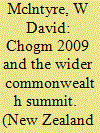

|
|
|
| 2 |
ID:
102748
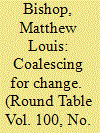

|
|
|
|
|
| Publication |
2011.
|
| Summary/Abstract |
In May 2010 two elections took place in traditional 'Westminster' polities-the United Kingdom and Trinidad and Tobago-in which coalition governments took power. In both countries, a significant part of the discourse in the run-up to election focused on the inequities of the Westminster model, and, in particular, first-past-the-post. Yet, interestingly, the end result in many ways mirrors the kind of outcome often championed by supporters of more proportional electoral systems. This article compares and contrasts the two different elections, and asks whether such coalitions are set to become a regular feature of a more mature Westminster model.
|
|
|
|
|
|
|
|
|
|
|
|
|
|
|
|
| 3 |
ID:
058625
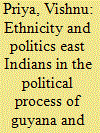

|
|
|
|
|
| Publication |
Special Issue 2004.
|
|
|
|
|
|
|
|
|
|
|
|
|
|
|
|
| 4 |
ID:
098881
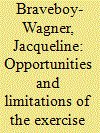

|
|
|
|
|
| Publication |
2010.
|
| Summary/Abstract |
The idea that a microstate such as Trinidad and Tobago can possess and use 'power,' a trait generally associated with a high level of military and economic capability, would appear to a traditional realist to be absurd. This is largely because power is still seen as exercised at the global systemic level or at regional levels that are globally significant. However, small states generally focus their foreign policies on smaller circles, primarily neighbours and dominant bilateral partners. By moving the power analysis (back) to the state (foreign policy) level, extending the definition of 'power' to include status ('position') and actual attempts to get others to adopt an influencer's preferences, and employing the newer views of power as soft and smart, this article argues that even very small states can exercise power within limited domains as long as they possess certain capabilities (in this case, energy resources) and are ready to seize available opportunities. The evidence shows, however, that the results of these attempts are still mixed, limited primarily by perceptual constraints on the part of both the small-state influencer and the target influencee.
|
|
|
|
|
|
|
|
|
|
|
|
|
|
|
|
| 5 |
ID:
106668
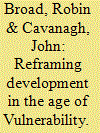

|
|
|
|
|
| Publication |
2011.
|
| Summary/Abstract |
This article argues that the contemporary triple crises of finance, food and environment, which have shaken the global economy since 2008, have exposed what should be seen as the Achilles heel of the dominant development theory and practice of the past 30 years: vulnerability. We argue that the crises not only add momentum to the delegitimisation of the old model, but also offer legitimacy for paths that lessen vulnerability and increase what we call 'rootedness' (a term we prefer to 'resilience' or 'sustainability'). After offering a brief history of 'vulnerable' development and reviewing the literature on vulnerability from the development, economic and environmental fields, we use this vulnerability versus rootedness frame to present analysis from our field work in two 'vulnerable' countries: the Philippines and Trinidad and Tobago. Integrating the article's sections, we then propose a new interdisciplinary framework for development that builds on and supplements the human rights, ecological, equity and democracy frames: the notion of 'rootedness' at the household, local and country levels.
|
|
|
|
|
|
|
|
|
|
|
|
|
|
|
|
| 6 |
ID:
129016
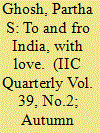

|
|
|